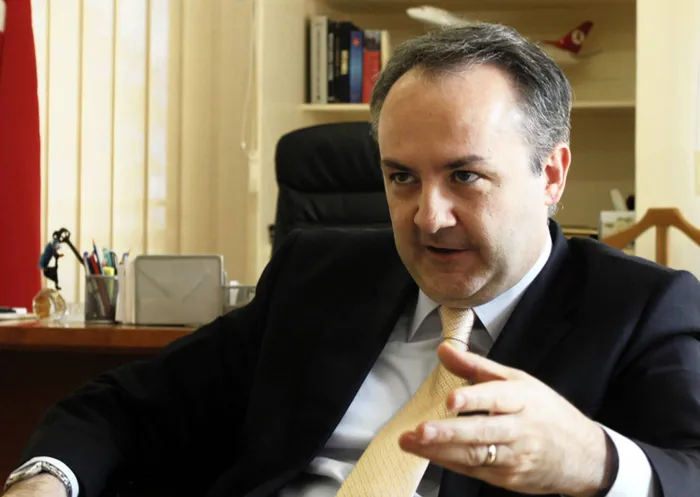
01/03/2012 Deha Erpek, Turkey embassy first consellor, explains the problems his country has with human trafficking and expliotation and the efforts that country's government are making to address the issue. Picture: Thobile Mathonsi 01/03/2012 Deha Erpek, Turkey embassy first consellor, explains the problems his country has with human trafficking and expliotation and the efforts that country's government are making to address the issue. Picture: Thobile Mathonsi
The Department of International Relations and Co-operation (Dirco) has confirmed that an investigation is under way into the alleged exploitation of young SA women working as dancers in Turkey.
The SAPS has said this week that the Hawks are investigating the allegations.
Deha Erpek, the Turkish embassy’s first counsellor, says that human trafficking is a serious problem in his country that the government is taking “very seriously”.
“It is something we are worried about and see as a crime-fighting priority.
“Turkey is a natural geographical bridge between East and West and a natural travel route.”
It took a brave Centurion teenager, Imogan Adams, to speak out in the hope that her story would serve as a warning to other dancers considering working in Turkey.
While in Turkey, Imogan flatly refused to perform sexual acts and was “fired”.
“It was hell. What they wanted us to do was wrong. We never signed up to do what they wanted us to do,” she said.
When she signed her contract she was expecting to dance in hotels, but after arriving in Turkey in January she and other girls were given another contract in which “hosting” became part of the job.
Imogan said they had to dress in short, tight miniskirts and high-heeled shoes.
“We had to dress up and make the men want us. We were instructed to get them to spend money at the hotels that we were dancing at, and that we must ‘flirt’ with them. The men, from across the world, would buy us gifts and in exchange we would be expected to give them sex.”
Imogan said she refused to perform sexual acts and was “fired”.
Allegedly threatened with the use of force to make her pay back money used to get her to Turkey, the teenager eventually managed to make contact with her mother in SA.
Her family allegedly received no help from the dance company that contracted Imogan, and contacted the SA embassy in Turkey. The embassy assisted Imogan to return home after finding she was allegedly being exploited and had gone to Turkey under false premises.
Erpek said Imogan’s allegations were the first the embassy had received of South Africans being exploited in Turkey.
“We have 32 South Africans who have work permits for dancing contracts and who are working in Turkey,” he said.
“Foreigners working in Turkey have to be aware of their rights. No one can force you to do something you are not contracted to do and if you feel that you are being exploited you must alert the authorities.
“It is imperative for foreigners to register themselves with their embassies in Turkey before they arrive. They also must ensure that they are fully aware of the work their contracts require them to do.
“If they feel that they are being exploited they must take immediate action.”
National police spokesman Captain Dennis Adriao said detectives from the Gauteng Organised Crime Unit were investigating the allegations, “which have been taken very seriously”.
“We cannot elaborate on the investigation as we do not want to jeopardise it. What we can say is that it is a priority case,” he said.
Dirco spokesman Clayson Monyela confirmed Imogan had been given consular assistance in returning home and said Turkish authorities were investigating the allegations.
“We are conducting our own investigation, which will coincide with the Turkish investigation.”
Asked what consular services had been provided to Imogan, Monyela declined to elaborate. - Pretoria News
